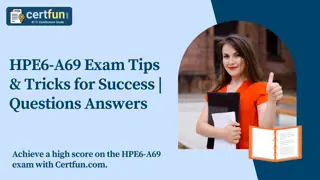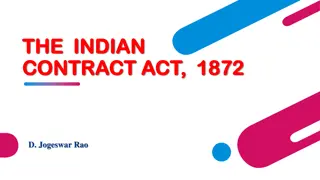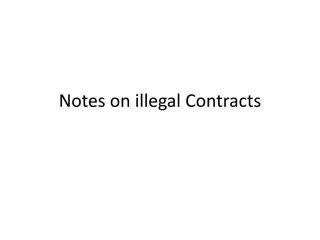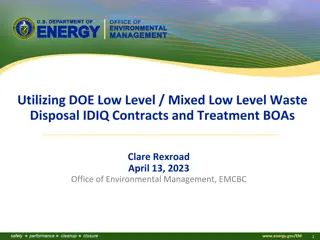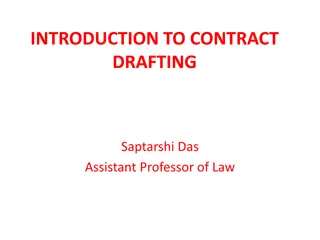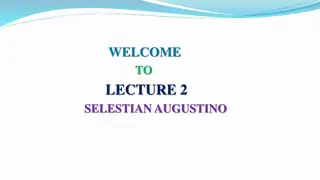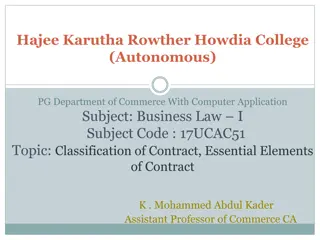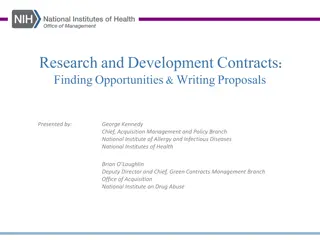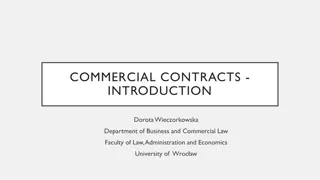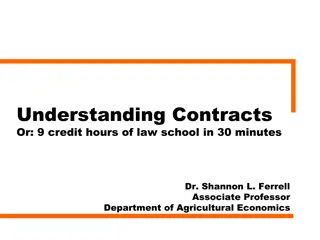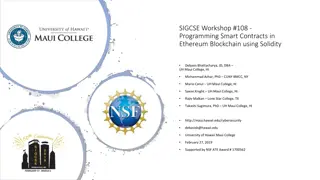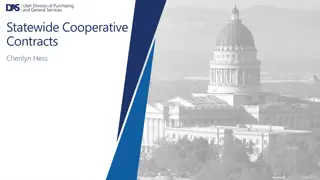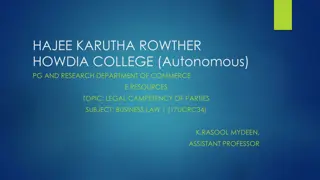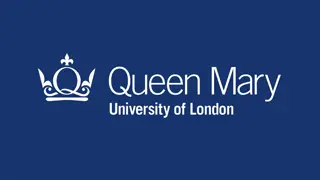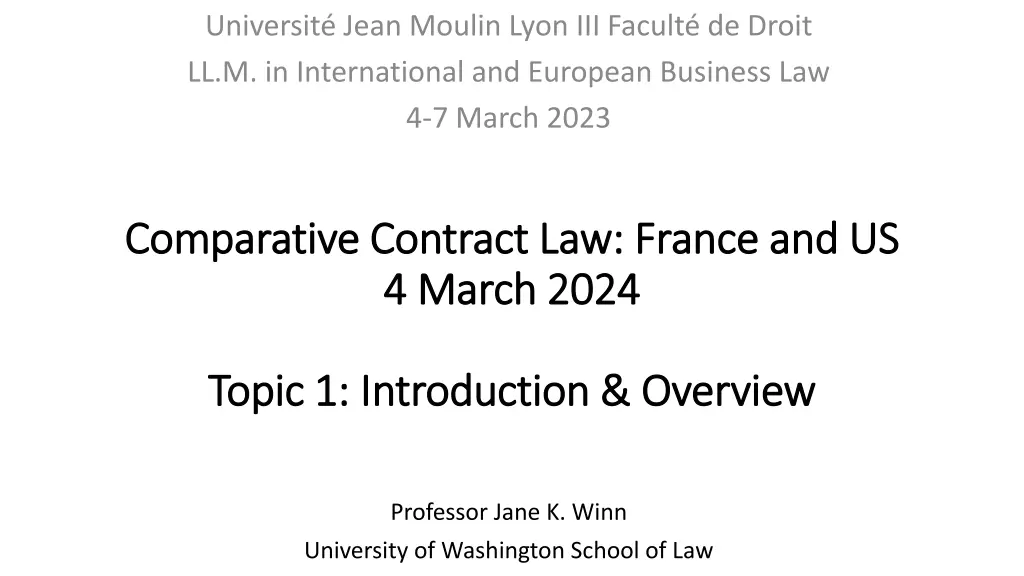
Understanding US-French Comparative Contract Law: Course Overview and Case Study
Explore the differences and similarities between American and French contract law in a comprehensive course led by Professor Jane K. Winn. Dive into historical, cultural, and legal nuances impacting both legal systems. Learn to analyze judicial decisions and their application to hypothetical scenarios. Discover the economic and political forces shaping contract law harmonization. Gain insights into private law regimes and their impact on global competitiveness.
Download Presentation

Please find below an Image/Link to download the presentation.
The content on the website is provided AS IS for your information and personal use only. It may not be sold, licensed, or shared on other websites without obtaining consent from the author. If you encounter any issues during the download, it is possible that the publisher has removed the file from their server.
You are allowed to download the files provided on this website for personal or commercial use, subject to the condition that they are used lawfully. All files are the property of their respective owners.
The content on the website is provided AS IS for your information and personal use only. It may not be sold, licensed, or shared on other websites without obtaining consent from the author.
E N D
Presentation Transcript
Universit Jean Moulin Lyon III Facult de Droit LL.M. in International and European Business Law 4-7 March 2023 Comparative Contract Law: France and US Comparative Contract Law: France and US 4 March 2024 4 March 2024 Topic 1: Introduction & Overview Topic 1: Introduction & Overview Professor Jane K. Winn University of Washington School of Law
Course Learning Outcomes Recognize the impact of historical and cultural differences on modern American and French contract law; Distinguish contract law doctrines that are substantially similar in both American and French contract law from those that differ significantly; Write a case brief of an American judicial decision and apply the holding of that case to a hypothetical fact pattern in order to state a legal outcome; Identify some of the economic and political forces supporting and opposing harmonization of contract law across national borders and between regions; and Relate differences in private law regimes such as contract law to larger questions of the global competitiveness of national economies.
Course Administration https://sites.uw.edu/jkwinn1/ujm-lyon3/ jkwinn1@live.com +06-72-31-73-75
Winn US-FR Contracts Topic 1: Introduction & Overview Laidlaw v. Organ, New French Civil Code 1104 Rowan 2016 French Contract Law: Good Faith Negotiations Pre-contractual negotiations new 2016 French Civil Code Provisions Hadley v. Baxendale Winn, American Legal Realism as Pragmatism, Hadley and Civil Code Winn Briefing Cases Issue Spotter Exams UJM-L3 Practice Exam Winn Comp Contract Issue Spotter Hypotheticals 2021
Laidlaw v. Organ FACT [Extrinsic data is relevant to price term] and [exclusively in possession of buyer] [seller asked a direct question, buyer was silent] [Key facts] [Background facts] everyone was waiting for the treaty to be signed knowing price would rise afterward, Organ knew treaty had already been signed but Laidlaw/Gauthier did not RULE Relevant information need not be communicated by knowing party to non-knowing party unless it would impose on non-knowing party WHETHER Organ/Buyer ought to have communicated extrinsic data to Laidlaw/Seller WHEN [Extrinsic data is relevant to price term] and [exclusively in possession of seller] [Key facts] CONCLUSION No duty to disclose RATIONALE: Marshall thinks there no way to limit contrary rule [Socialism]
L'arrt Manoukian du 26 novembre 2003 In 2003, the Alan Manoukian company sued individuals (the X consorts ) that had entered into negotiations to sell to him their company named Stuck then broken off the negotiations Negotiations started in spring 1997 and a deadline of 10 October 1997 was set for the seller to fulfill several conditions so the sale could close At the request of the X consorts, this deadline was extended to 31 October 1997 and 15 November 1997 On 13 November 1997, Manoukian sent a final agreement to the X consorts for their approval and signature by 15 November 1997, but Manoukian didn t know that they d already sold their company to another company Les Complices (the accomplices) on 10 November 1997 The X consorts did not inform Manoukian that they had sold the company to someone else until 24 November 1997, Manoukian thought the delay in signing the final agreement was due to waiting for the return of the Stuck s public accountant The Court of Appeals ordered the X consorts to pay Manoukian 400,000 ff (equivalent to about US$66,000 at the time) in compensation, both the X consorts and Manoukian appealed The Commercial Chamber of the Court of Cassation rejected the appeals, ruling that the abrupt, unilateral termination of negotiations was in bad faith and thus a basis for liability The company Les Complices was not liable to Manoukian because merely being aware that a contractual counterparty was negotiating with someone else was not grounds for liability The measure of damages was not the profits Manoukian might have made if it had purchased the company because there was no contract, it was only compensation for expenses incurred because liability is based on tort, not contract
French Rule that would apply in Laidlaw v. Organ RATIONALE: Marshall thinks there no way to limit contrary rule The early bird gets the worm [you have to reward people who work harder] French disagree: Civil Code 1104 Contracts must be negotiated, formed and performed in good faith; Civil Code 1112 information must be disclosed if: Knowing party has actual knowledge Direct and necessary link between non-knowing party s agreement to contract and the information Non-knowing party s ignorance is not culpable [fault]
Summary: US versus French Law US Rule: *NO* general duty to disclose EXCEPTION: non-disclosure imposes on other FR Rule: general duty to disclose EXCEPTION: Non-knowing party s ignorance *IS* culpable [fault]
Lexi-Fiche: Droit des Contrats 2017 1. Duty to Negotiate in Good Faith 2016 reforms Negotiations or "pre-contractual negotiations" (Article 1112) refer to pre-contract discussions. This pre- contractual phase allows the parties to discuss and negotiate the terms and conditions of the contract to be concluded. a) the obligations governing the talks If the parties' negotiations can take different forms, they are always free. The jurisprudence since the 2016 reforms has framed this freedom by imposing a series of obligations to the parties to a negotiation. General duty of good faith: negotiations are required to meet the requirements of good faith (Article 1112). General duty of Information (Article 1112-1) A general duty to disclose information arises when 3 conditions are met: One of the parties must be aware of information. The text states that the party "knows the information" and not should know of it. The known information must determine whether or not the other party accepts, it must have a "direct and necessary link with the content of the contract or the quality of the parties" (article 1112-1 paragraph 3); The known and decisive information must be communicated to the other party only if the latter did not know it legitimately". However, the "duty of information does not concern the estimation of the value of the benefit" (Article 1112-1 paragraph 2).
1. Les pourparlers Les pourparlers ou n gociations pr contractuelles (article 1112) d signent les entretiens pr alables la conclusion d un contrat. Cette phase pr contractuelle permet aux parties de discuter et de n gocier les termes et conditions du contrat conclure. a) Les obligations encadrant les pourparlers Si les n gociations des parties peuvent prendre diff rentes formes, elles sont toujours libres. La jurisprudence puis la Reforme sont venues encadre cette libert en imposant une s ries d obligations aux parties une n gociation. Devoir g n ral de bonne foi : les pourparlers doivent imp rativement satisfaire aux exigences de la bonne foi (article 1112). Devoir g n ral d information (article 1112-1) Trois conditions d existence du devoir g n ral d information : L une des parties doit avoir connaissance d une information. Le texte pr voit que la partie connait l information et non devrait la connaitre. L information connue doit tre d terminante du consentement d l autre partie, elle doit avoir un lien direct et n cessaire avec le contenu du contrat ou la qualit des parties (article 1112-1 alin a 3) ; L information connue et d terminante ne doit tre communiqu e a l autre parte que si cette derni re l ignorait l gitiment . Toutefois, le devoir d information ne porte pas sur l estimation de la valeur de la prestation (article 1112-1 alin a 2).
Hadley v. Baxendale (1854 England) Foreseeability limit to expectation damages Miller shipped broken shaft to London and told carrier to hurry Replacement shaft was returned to miller 5 days late due to unexcused delay by carrier Miller wanted carrier to pay 5 days of lost profits Holding: injured party may not recover damages for losses suffered if possibility of loss was not known/foreseeable to breaching party at time contract was formed
Napoleonic Code 1804 Art. 1150 A debtor is only held to damages which were foreseen or which could have been foreseen at the time of the contract, when it is not by his willfulness that the obligation is not executed. Le d biteur n est tenu que des dommages et int r t qui ont t pr vus ou qu on a pu pr voir lors du contrat, lorsque ce n est point par son dol que l obligation n est point ex cut e.
American Pragmatism, Legal Realism How Second Consul of the French Republic Cambac r s, Bigot- Pr ameneu, Maleville, Portalis, and Tronchet working in 1804 with Roman law 2,000 years old reach the same conclusions as 21st century economists in America? The Hadley rule, which denies recovery for losses that the promisor could not ordinarily foresee, is thought to provide promisees with incentives to reveal how much they value performance, in order to give the promisor optimal with incentives to take care.
American Pragmatism as a School of Philosophy Rejects Ideas of Modern Western Philosophers such as Descartes, Kant Fallibilism: We have empirical knowledge of the world even though that knowledge cannot be proven with complete certainty Anti-skepticism: Even in the absence of certain knowledge, we can justify the judgments we make Pragmatic Maxim/Pragmatic Test Consider the practical effects of the objects of your conception. Then, your conception of those effects is the whole of your conception of the object." Charles Sanders Peirce "The opinion which is fated to be ultimately agreed to by all who investigate is what we mean by the truth, and the object represented in this opinion is the real. Charles Sanders Peirce What works is true
Case Brief to Issue Spotter Exam Common law reasoning by analogy Simplified formula for writing a standard case brief to DRILL Transfer the idea from the case brief to a new hypothetical fact pattern Creative problem solving: no one has ever analyzed the legal issues in this fact pattern before For an American issue spotter exam, the correct answers include: No, this rule does not apply MAYBE Yes, this rule does apply
Appreciate Flowers from Horseback Reasoning Case to Case Continuously Evolves Holding Holding Holding Holding Holding Disputes
Drills, Practice Skills vs Performance The simplified system for writing a case brief in this class is not real legal reasoning, it is just a DRILL like sports or music or dance Agility ladder drill football, soccer, basketball, tennis https://youtu.be/vuYe7BODg7o Scales in piano or other musical instruments Barre exercises in ballet Other examples?
This is a model of practice, not practice All models are wrong but some are useful. George Box Jorge Luis Borges, https://en.wikipedia.org/wiki/On_Exactitude_in_Science The most accurate map would be as big as the world, but not very useful https://kwarc.info/teaching/TDM/Borges.pdf
What Is a Rule? IF [scope of rule], THEN [outcome] IF [21 years old], THEN [OK to drink alcohol] IF [driving a car on this road], THEN [OK to drive up to 60 MPH] Scope (i.e., circumstances when this rule applies) are often not spelled out explicitly
What Is an Element of a Rule? IF [US Citizen & 18 years old], THEN [can vote] US citizen is ELEMENT, 18 years old is ELEMENT, can vote is OUTCOME I m French, can I vote? No I m American and 17, can I vote? No I m American and 18, can I drink alcohol? No (because that s not voting) I m American but my parents never registered my birth and cannot remember my birth date but it was around 18 years ago, can I vote? MAYBE
Relevant/Irrelevant Fact Facts can be KEY or outcome determinative Facts can be background information (interesting to the reader, but irrelevant to the legal decision) Fact can be designed to mislead or distract the reader ( spin facts) Example: IF [US Citizen & 18 years old], THEN [can vote] US citizen, 18 years old, voting are all key facts Live in Seattle is background information Card-carrying member of the Communist Party is irrelevant
Apply Rules to Facts to Find Outcomes Rule = IF [driving a car on this road], THEN [OK to drive up to 60 MPH] Facts = driving 55 MPH Apply rule to facts: because driving a car on this roadat 55 MPH is not over 60 MPH, no speeding ticket [outcome]
Four Part Issue Statement WHETHER [rule element in dispute] [party 1] [party 2] WHEN [key fact]
Case Brief Title & Citation Key Facts 1, 2, 3 Rule [not usually included] WHETHER [rule element in dispute] [party 1] [party 2] WHEN [key fact] Holding: [YES] [MAYBE] [NO] Rationale [why is this outcome fair?]
Issue Spotter Exam Question: Issue-Rule-Apply-Conclusion Answer WHETHER [rule element in dispute] [party 1] [party 2] WHEN [key fact] Rule Apply rule to facts: One the one hand Key Facts 1, 2 + Rule Element On the other hand Key Facts 2, 3 + Rule Element Conclusion: [YES] [MAYBE] [NO]
Compare Brief to IRAC Case Brief IRAC Title & Citation Key Facts 1, 2, 3 Rule [not usually included] WHETHER [rule element in dispute] [party 1] [party 2] WHEN [key fact] WHETHER [rule element in dispute] [party 1] [party 2] WHEN [key fact] Rule Key Facts 1, 2 + Rule Element Key Facts 2, 3 + Rule Element Holding: [YES] [MAYBE] [NO] Conclusion: [YES] [MAYBE] [NO]
Is Contract by Telegraph Enforceable? Telegraph was once a disruptive innovation so courts had to clarify how reasonable parties would expect it to be used to form contracts. First reported case involving contract formation by telegraph: It makes no difference whether that operator writes the offer or the acceptance in the presence of his principal and by his express direction, with a steel pen an inch long attached to an ordinary penholder, or whether his pen be a copper wire a thousand miles long. In either case the thought is communicated to the paper by the use of the finger resting upon the pen; nor does it make any difference that in one case common record ink is used, while in the other case a more subtle fluid, known as electricity, performs the same office. Howley v. Whipple, 48 N.H. 487 (1869)
Reasoning by Analogy: Old and New Media Source: Pen & Paper Target: Telegraph Evidence of intent Manifestation of assent to be bound expressed in words Manifestation of assent to be bound expressed in words In writing Words written on a piece of paper 1st telegraph operator sends message, then electrical transmission, then 2nd telegraph operator receives message Signed by the other party Signature made by hand with pen on paper Name of sender is provided to first telegraph operator with intention to authenticate the message and sent as part of message Legal Outcome Contract is enforceable Contract is enforceable
Legal Reasoning by Analogy Legal Reasoning Case to Case (Edward Levi) Source of Facts Source: Original Source: Target Is information transmitted by telegraph a Signed Writing ? Is Manual Signature with Pen on Paper a Signed Writing? Rule Element Legal Analysis Legal Outcome Yes, binding contract Yes, binding contract
US Law School Exam Question Design Prove you know how to apply both rules at once EXAM QUESTION Scope of Rule One Scope of Rule Two Offer, Acceptance Preliminary Negotiations are not binding contracts and Consideration create a binding Edge Cases contract
Title & Citation Relevant Facts General Rule Issue in Case WHETHER WHEN Holding [Rationale]
Issue Spotter Exam Question Issue WHETHER WHEN General Rule Apply One Side Apply Other Side Conclusion Yes/Maybe/No


